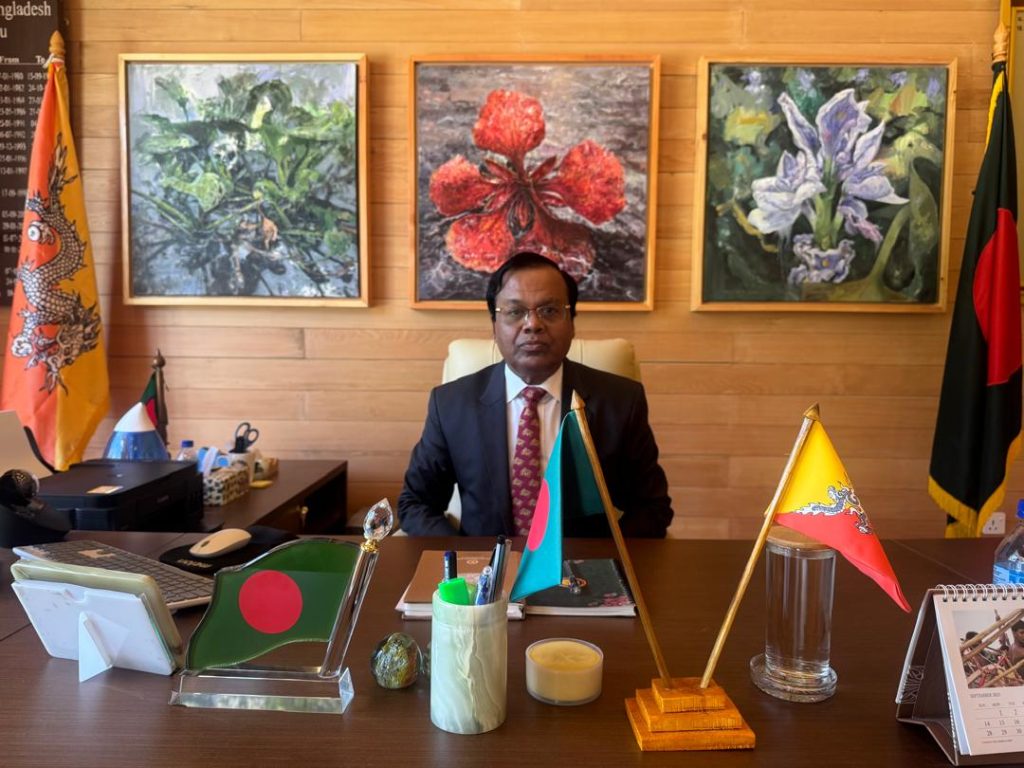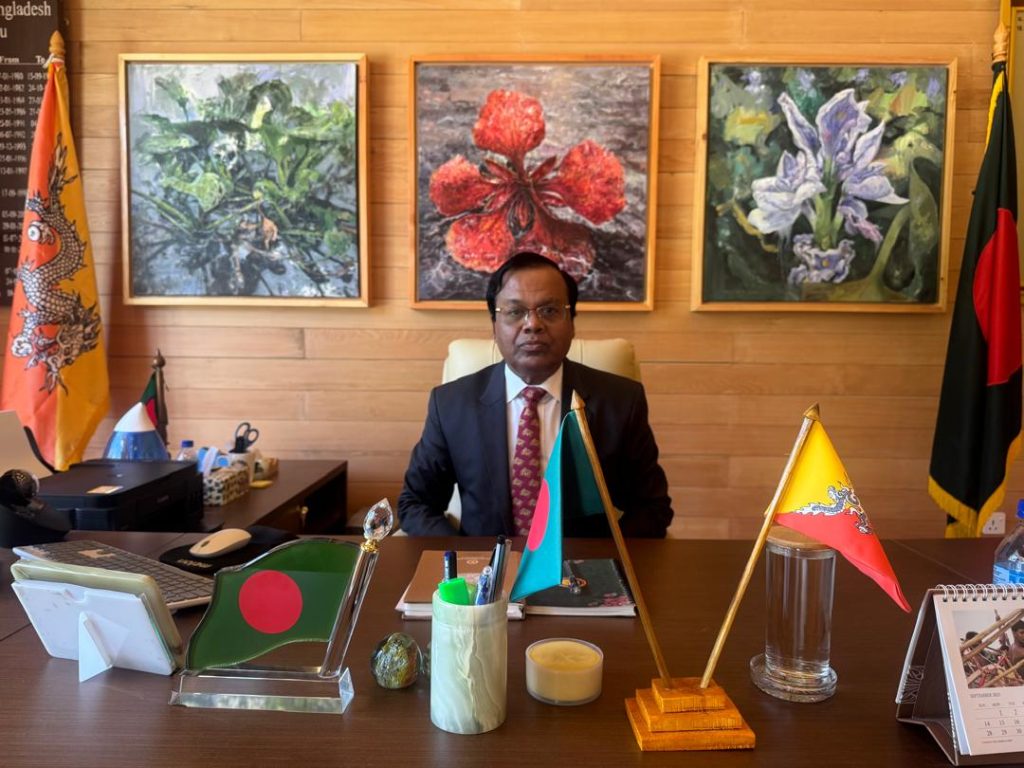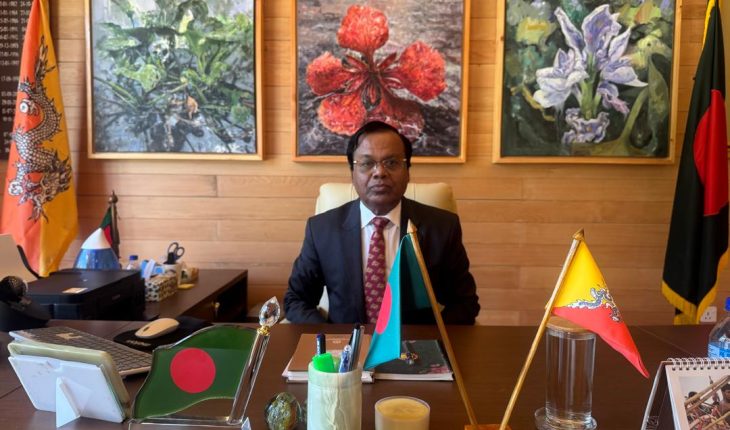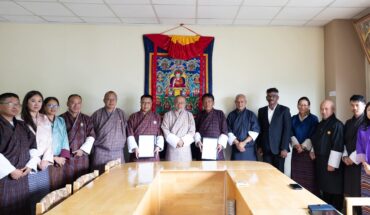

The Ambassador of Bangladesh to Bhutan, Shib Nath Roy, says a formal visit by Bhutanese leadership to Dhaka next month is expected to advance these talks and finalize agreements on connectivity and other economic issues.
In a recent conversation with our reporter Kinzang Dorji Tshering, he discussed the evolving relationship between the two countries, touching on the inauguration of the new Bangladeshi embassy complex in Thimphu, initiatives to boost bilateral trade and investment, hydropower cooperation, development of economic zones, and efforts to enhance regional connectivity among others.
Here’s a summary of the tete-a-tete with Bangladesh Ambassador Shib Sath Roy:
Q. The inauguration of the new embassy complex marks a milestone in Bhutan–Bangladesh relations. How do you see this facility strengthening diplomatic and economic cooperation?
Ambassador Roy: The inauguration of the new Embassy complex in September was a historic milestone. The event was attended by delegations from both countries, including foreign secretaries and senior officials, with almost 185 guests in total. It reflects the longstanding friendship between Bhutan and Bangladesh, which began in 1971 when Bhutan became the first country to recognize Bangladesh’s independence.
The complex not only symbolizes diplomatic commitment but also serves as a platform to expand economic and cultural engagement. Over the decades, cooperation has grown across multiple sectors such as trade, connectivity, healthcare, culture, ICT, hydropower, and agriculture.
From Bhutan’s side, land has been allocated in Dhaka’s Baridhara area for the construction of a Royal Bhutanese Embassy, demonstrating reciprocal support. I believe that the establishment of these diplomatic missions will further strengthen our bilateral engagement and provide a solid foundation for deeper cooperation in both economic and diplomatic arenas.
Q. Bangladesh and Bhutan signed a preferential trade agreement (PTA) in 2020. How can the GMC framework further boost bilateral trade and reduce existing barriers?
Ambassador Roy: The PTA has provided Bangladesh duty-free access to 100 products, while Bhutan receives duty-free treatment on 34 products. While the PTA has been effective, the new GMC framework is designed to enhance trade facilitation further by reducing procedural barriers and creating mechanisms to support balanced economic exchange.
The framework will provide structured pathways for Bhutanese producers to enter the Bangladeshi market, especially for niche and organic products, while enabling Bangladesh to increase its exports. Last year, a commerce secretary-level meeting—referred to as the CSLM—was held to discuss these developments. Next month, a follow-up meeting is scheduled to finalize agreements, with participation from commerce secretaries and related high-level officials from both countries.
Once implemented, the GMC framework will strengthen bilateral trade, support industrial growth, and create opportunities for businesses in both nations.
Q. Hydropower is a key area of cooperation. What role can GMC play in facilitating energy trade between Bangladesh and Bhutan?
Ambassador Roy: Hydropower represents a major area of collaboration. Bangladesh currently faces an electricity demand of around 18,000 megawatts. While there are supplies from Indian sources, importing hydropower from Bhutan is more cost-effective and reliable.
Efforts are underway to finalize a memorandum of understanding on energy trade between the two countries. Once agreed, it will clearly define the framework for Bhutanese electricity exports to Bangladesh, supporting both domestic consumption and industrial production.
Hydropower is particularly relevant for initiatives like the Gelephu Mindfulness City project, a special economic zone designed to facilitate industrial production and export. Affordable and reliable energy will be critical to making such initiatives economically viable.
Q. Bangladesh has a large consumer market, while Bhutan specializes in organic and niche products. How can GMC help Bhutanese producers’ access Bangladeshi markets?
Ambassador Roy: Bhutan’s current exports to Bangladesh are valued at approximately Nu 675 million, while imports from Bangladesh stand at Nu 137 million, indicating a significant trade gap. The GMC framework, along with special economic zones such as Mindfulness City, will enable Bhutanese producers to scale up production and access the large Bangladeshi market more efficiently.
By producing goods locally within designated industrial zones in Bangladesh, Bhutan can reduce production costs while maintaining quality. This will allow Bhutanese entrepreneurs and technical professionals to expand their businesses and exports. The framework also promotes collaboration between investors, exporters, and manufacturers, fostering a more robust and sustainable economic relationship.
Q. Looking ahead, how can GMC strengthen regional value chains under BIMSTEC?
Ambassador Roy: The GMC has the potential to transform Bhutan and Bangladesh into key hubs within South and Southeast Asia. By facilitating investment, industrialization, and trade, it will attract businesses and create opportunities for regional integration.
For Bhutan, the GMC can be particularly transformative. It will provide employment for technical professionals, address unemployment, and encourage youth participation in industries. Additionally, it will allow Bhutanese companies to engage in export-oriented production, strengthening both domestic capabilities and regional value chains.
The Mindfulness City project is designed to leverage these opportunities. By integrating industrial development, infrastructure, and connectivity, it can serve as a regional business hub, benefiting both countries and fostering economic cooperation across the region.
Q. Bhutan has sought a third international internet gateway through Bangladesh. What is the current status?
Ambassador Roy: Discussions regarding a third internet gateway have been ongoing for over two years. The main challenge has been pricing, as the corridor passes through India. Initially, the costs proposed by India were not feasible for Bhutan.
Despite these challenges, both governments remain committed to implementing the gateway. Our Prime Minister has expressed willingness to provide the service at a friendly cost, and discussions are ongoing between relevant authorities in both countries. A formal visit by Bhutanese leadership to Dhaka next month is expected to advance these talks and finalize agreements on connectivity and other economic issues.
The third internet gateway is crucial not only for improving digital connectivity but also for supporting trade, business operations, and economic activities within the GMC framework. Once operational, it will strengthen bilateral and regional cooperation in technology and communications.





